

During medieval times Bhatts (ballad singers) were part of every kingdom in India, their job was to compose and sing martial songs. With their narrative and descriptive poetry of war, their songs and music led the warriors to the battlefield. Marching to the battlefield to meet their enemies, they would narrate to them the heroic deeds of their forefathers, who had laid their lives for the honour of the motherland. They recited the martial poems and aroused passion of the heroes for war and love for the motherland. The compositions of the Bhatts attached to the courts of the latter Sikh Gurus, which are now included in the Guru Granth Sahib are eulogies to the first five Gurus.
Bhatt Bani (the hymns by the bards) comprising twenty pages is incorporated in the concluding part of Adi Granth. The Bhatts are supposed to be the descendants of Koshish Rishi and are linked with the Sarshat Brahmins. It is a fact that almost all the eleven Bhatts belonged to Punjab and were residents of Sultanpur Lodhi (district Kapurthala) where Guru Nanak had served in the Modikhana for 13 years. According to Bhatt chronicles they were sons or nephews of Bhikha and Toda Bhatts. It appears some of them may have attended earlier congregations of Guru Amar Das and Guru Ram Das.
These Bhatts used the popular form of poetry called "Swaiya Chhand", which gave their Swaiyas a very distinctive style. Their rich language, full of poetic imagery, is packed with elegant and decorative vocabulary.
The eleven Bhatts whose Bani is included in Adi Granth are:

Kalshar who is also known as Kalh and Talh was the leader of the group of the Bhatts who had come to the congregation of Guru Arjun Dev. Taking into consideration the total contribution of Swaiyas by the Bhatts, which is 123, Bhatt Kalshar alone has contributed 54 Swaiyas which is a considerable share. A detailed account of his Swaiyas, eulogising various Gurus is as follows:
Swaiyas written in praise of:
1st Guru - 10
2nd Guru - 10
3rd Guru - 9
4th Guru - 13
5th Guru - 12
Total 54
Here are some representative Swaiyas of Bhatt Kalshar:
Nanak enjoyed the Rajyog as in - his heart dwelt the Peerless Lord.
He saved the whole world, dwelling upon His Name alone.
Sanak and Janak sung his praises, coyntless did alike, throughout ages,
Blessed is Guru Nanak, who took Avtar in human form, and came to earth.
Says Kal the poet, "His victory was hailed all over the earth"
And it echoed in the underworld as well.
O, Guru Nanak! You are blessed by the Lord, as He lovingly, dwells in you.
During Satyug, you enjoyed the state of Rajyog,
When you overpowered Bali by becoming a dwarf,
During Treta Yug you were named Rama the king of Raghu clan
During Duapar Yug you were known as Krishna who liberated Kansa
You granted the kingdom to Ugrasena and blest your lovers with fearlessness.
During Kalyug you were called Nanak, Angad and Amar Das,
Everlasting and static is your rule,
As this is the will of the Eternal Lord.

Bhatt Jalap, also wrote under the name of Jalh. Bhatt Jalap composed five swayas that are included in the Adi Granth. Jalap Bhatt extolled the Guru in the following words: "Seeing the Guru's vision, the disciple is blessed with the Lord's meditation, service, truth and contentrnent Whosoever seeks the Guru's refuge is liberated from the account of the city of death" (p.1394).
His bani starts from Page 1394, Line 4 to Page 1395, Line 2. He appears to be an intellectual, well known and had a lot of knowledge of hindu mythology. As per the chronicles, Jalap was the son of Bhatt Bhika & Brother of Bhatt Mathura and Bhatt Kirat. Being a true devotee of Guru Amar Das, he preaches complete submission to him.

Bhatt Kirat, son of Bhikha, besides being a poet, had the privilege of being an enrolled soldier in the army of Guru Hargobind Sahib, the 6 11 Guru. He had attended the celestial grandeur of the Darbars of Guru Ramdas and Guru Arjun Dev and had also enjoyed later on the benevolence of the Master of Miri and Piri, under whose command, he had fought in the battlefield.
When it came to the writing of Swaiyas, he chose to eulogise Guru Amar Das and Guru Ram Das. There are eight Swaiyas authored by him included in Adi Granth at pages 1395 to 1405. Out of these, four Swaiyas are in praise of Guru Amar Das the 3rd Guru and an equal number in praise of the 4th Guru. A staunch believer in the house of Gurus, he died fighting under the command of Guru Hargobind Sahib. Extreme humility and complete submission can be observed in the following hymn authored by him.
A confirmed sinner and idiot of the first water,
The poison I take, and refuse the nectar.
For my wife and son, the delusions I take,
Whose love is selfish and passion fake.
The nectar of your congregation, celestial and clean,
Vanquishes the death, whose fear I preen.
Prays_Bhatt Kirat, humble and meek,
Guru Ramdas, your protection, I seek.
A sample of the poetry of Bhatt Kirat:
God by Himself, manifested into His creation,
He was Formless, before he took to the form of Guru Amardas
And he enlightened the whole world.
The All-pervading Lord, revealed Himself through the Guru.
Whosoever-expressed faith in the Guru, was liberated,
And the secrets of the Lord's realm were revealed to him.
In the house of Nanak, Lehna was known as Angad,
And then the perfect Guru Amardas manifested in him.
O, Guru, my only saviour from the endless births and deaths,
I seek your refuge. Please save.the sinner like me. (2-16)

Bhika (pronounced Bhikkha) Bhatt, a Brahman bard of Sultanpur Lodhi in presentday Kapurthala district of the Punjab, became a Sikh receiving the rites of initiation at the hands of Guru Amar Das. He lived up to the time of Guru Arjan to whom he introduced sixteen other Brahman minstrels from his community.
They sang in his presence praises to God and the Gurus. Some of their compositions were included by Guru Arjan in the Guru Granth Sahib. One of the two stanzas by Bhikha recounts his wanderings in search of a true saint ending with his ultimate success by the grace of God.
"Lord," sang the bard, "hath caused me to meet the Guru; as thou willest for me so must I receive O God!"
I wandered all over the place Searching for a hermit with heavenly Grace. I met many a mendicant, high flying on the ego fleet Soft-spoken, polished, vainful and sweet. In vain I wasted all my time, None of them was spiritually fine. Like an empty vessal or hollow pot, They talked a lot, all but rot. God in their hands was just a pawn Shady deals were in their clan. At last I reached the rightful place, With Thee Guru Amardas I found solace.

Bhatt Salh, a devotee Bard, whose three Swaiyas are incorporated in the Adi Granth, was protagonist of Gurmat Philosophy. He carried out preachings of Gurmat. He was from a Gurmukh/ Vedic Family. Not much is known about his history. In his 3 hymns, he explained the way the a soul can control its internal vices and move forward through the path of dharma with the results such a soul will get. He also admired and explained that how Satgur Amar Das and Satgur Ram Das can carry a soul across to other side. His three hymns covered the whole Gurmat philosophy in brief.
What are Demons?
ਕਾਮ ਕਰੋਧ ਲੋਭ ਮੋਹ ਅਪਤ ਪੰਚ ਦੂਤ ਬਿਖੰਡਿਓ ॥
He has cut down the five demons of unfulfilled sexual desire, unresolved anger, unsatisfied greed, emotional attachment and self-conceit.
In Gurmat Philosphy, as explained by Bhatt Salh, demons are a state of the soul in which a soul's thoughts takes it away from truth. All such souls, thoughts or people having such idea's are called demons. It could be a Keshdhari Sikh or a saffron dressed hindu or green dressed muslim.
Attachment (Moh) is the quality of a demon. As 'attachment' has a demonic quality, it is also attributed as a demon because this keeps a person to be consumed with the temporal world and they forget to move forward in spiritually.
Desire (Kaam) is another quality of a demon. Desires should be those which are only absolutely necessary for the body or soul. Other or more extreme desires for just the body are not recommended. Desires lead to attachment with temporal things and this mean the soul move away from its main mission. Such soul will never able to get to the true throne and eternal kingship. Sexual desire is a part of Kaam.
Anger is third demon. It does not let soul remain attached with itself. It declines spiritual growth and affects body. In anger, a person speaks rubbish, which is not Gurmat. Speaking Gurmat one should speak through intellect.
Greed is another demons, which if stuck to the soul, keeps one entangled in money and worldly affairs.
Ego is a demon which brings a persons selfishness, self-centredness (showing off, etc) to the front. A soul should be humble as possible and this cannot happen when it is blinded by ego.
There is relation between these demons as explained by Bhatt Salh.
ਮੋਹ ਮਲਿ ਬਿਵਸਿ ਕੀਅਉ ਕਾਮ ਗਹਿ ਕੇਸ ਪਛਾੜਯਯਉ ॥
He has crushed and overpowered emotional attachment. He seized sexual desire by the hair, and threw it down. Bard Sala-y
ਕਰੋਧ ਖੰਡਿ ਪਰਚੰਡਿ ਲੋਭ ਅਪਮਾਨ ਸਿਉ ਝਾੜਯਯਉ ॥
He cut anger into pieces, and sent greed away in disgrace.(Ang 1406, Line 11)
Of these, one swaiya is in praise of the 3rd Guru and two swaiyas are in praise of the 4th Guru. According to Bhatt Salh, the Gurus had attained their spiritual heights through meditation, dedication and devotion. They had captured victory over the worldly desires by controlling their mind. They had subjugated the evils like passion, anger, greed, ego and lust and were perfect examples of contentment, after acquiring the boon of Naam (name of the lord).
You are the True Master, throughout the Four Ages, As the Lord's Light is dwelling in your heart.
From the beginning of the world, the angels, heavenly laodies, Seekers and the true followers,
Longed to serve thee.
You are the Primal Lord, from time in memory of man, And it is you who have upheld all the three worlds. You are the saviour of the Vedas.
You have mastered the circle of births and deaths.
Guru Amardas has established you as liberator of the world, And now, you ferry across the ocean, one and all.
Says Salh the Bhatt, "You are the only one, the liberator and dispeller of sins".
I submit myself-to your compassion, Guru Amardas! (2-60)
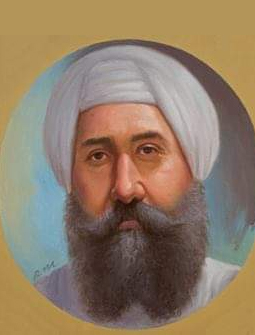
Bhalh was a Bard and Devotee of God whose Bani is present in Sri Adi Granth. Only one Swaiya of Bhatt Bhalh is available comprising of 4 lines. It is written in praise of Guru Amar Das. Surprisingly enough, this small poem is impregnated with symbolic imagery, refined poetic vocabulary, beautiful syntex, and impressive expression.
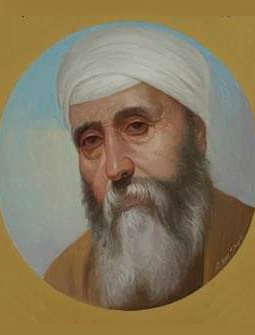
Bhatt Nal authored sixteen Swaiyas, all in praise of Guru Ram Das the 4th Guru. Surprisingly, the style of this poet is similiar to Bhatt Kalshar. In certain cases, the use of images and metaphors is the same. For instance Bhatt Nal called Guru Ram Das, Janak, as had been mentioned earlier by Bhatt Kalshar. The vocabulary and metres are also similar.
The unique feature of Bhatt Nal was that he introduced two new chhands called jhoolna and radd. As in the case of Bhatt Kalshar, the group of eleven Bhatts came to the congregation of Guru Arjan Sahib Ji. This historical fact was confirmed by Bhatt Nal. He said that after touching the sacred feet of Guru Arjan Sahib Ji, a sense of solemnity, peace and serenity prevailed upon him.
Sacrifice I am, unto the Name of the True Guru. How do I serve him and how do I praise him?
I can only utter the Name and bow before him with my folded hands. Once the Name is realised through thoughts _and actions,
Only then, I shall know the Peerless Lord, the only One,
This knowledge is embedded in my heart, through the Grace of the Guru. Saith Nalh the poet, "As the philosopher's stone, converts glass into gold And the Chandan tree with its association, infuses the neighbouring vegetation with fragrance."
So does the devotion of Guru, transform a person. Only the glimpse of whose door is enough
to rid a person of his sins, lust and wrath,
I am sacrifice unto the Name of the True Guru.
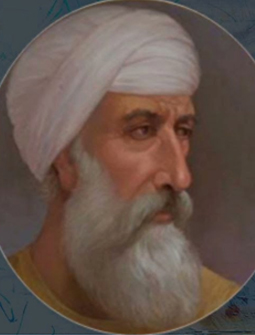
Bhatt Gyand was a bard and saraswat brahmin who became a Gursikh after listening to wisdom of truth from fifth guru. He composed thirteen Swaiyas in praise of God and also admired the Gurus and other Bhagats in those swaiya's.
Bhatt Gyand introduced the word 'Waheguru' in gurbani. Not much is known about his life but his bani has a key importance in sikh philosphy.
On page, 1401/1402/1403/1404, there is a beautiful composition of Bhatt Gyand on God. God is called Satguru (not Satgur), Siri Guru, Vaheguru, Guru (not Gur), Sri Ram in these swaiyas. Some confuse Bhatt Gyand's writings as complete praise of Guru Ram Das, however at the beginning of his swaiya it mentions ਸਿਰੀ ਗਰੂ ਸਾਹਿਬ ਸਭ ਊਪਰਿ ॥ which means 'the supreme Guru who guides the whole world and the whole universe is above all'.
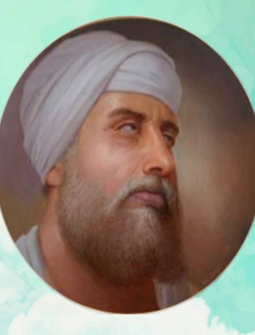
Bhatt Mathura is the author of fourteen Swaiyas, out of which seven are in praise of Guru Ramdas the 4th Guru and the other seven in praise of Guru Arjan Sahib the 5th Guru. He was the great admirer of the house of Nanak and had immense faith in the Gurus. He was fully aware of the message of Gurbani (utterances of the Gurus) and has very intelligently used the typical vocabulary of the scriptures while describing the Holy Grace of the Gurus.
Being a scholar, Bhatt Mathura composed his Swaiyas in the language easily understood by the masses, which was the secret of his popularity. Bhatt Mathura was a staunch believer of the transmigration of the soul. He starts with Guru Nanak and traces the history of the first five masters. He goes to the extent of saying that God itself is residing in the form of Guru Arjan Sahib and God Almighty embeded his own light in the heart of Guru Nanak. He says:
He passed his light on to Guru Angad and the light merged in light.
Guru Angad with utmost humility, accepted Guru Amar Das as the True Master. He passed on his holy canopy to Guru Ram Das. Sayeth Mathura, only a glimpse of Guru Ram Das inspired Guru Arjan to follow the trail of sublimity. The entire universe acknowledged and saluted the greatness of Guru Arjan,
Benignly bestowed by the Lord itself. As long as the writ of the Lord on the forehead does not reveal itself, one lost in the mist of disbeiief, keeps yearning.
The world, sunk in the deep sea of Kalyug, disillusioned, without any hope or faith,
Says Mathura the poet, "The essence of the truth" Guru Arjan came to the world, to save all the sinners, And all those, who meditated on the Guru, - Were redeemed of the circle of births and deaths.
Sri Guru Granth Sahib Ji, Bhatt Mathura, Ang 1409.
Mathura and his father Bhikkhã were among the Bhatt or Brãhman bards who attended upon the Gurus and who composed panegyrics in their honour. Their prosodic form is savaiyya. Bhatt Mathurã was also trained in martial skills during the time of Guru Hargobind (1595-1644). He fell a martyr in the battle of Amritsar which, according to Bhatt Vahi Multàni Sindhi, took place on 14 April 1634.
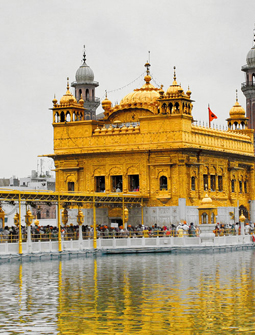
Bhatt Bal is the author of five Swaiyas written in praise of Guru Ram Das, the 4th Guru. The subject of his Swaiyas mentions the transmigration of the soul and continuity of the divine light from one Guru to the other. He composed poetry, in the style and diction of Bhatt Nal. His Swaiyas may be distributed under three distinct categories:
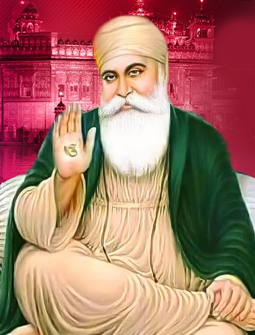
Bhatt Harbans, known for his tapas, renunciation and meditation, accepted the Sikh faith at the hands of Guru Arjan, was head of the Sikh dharamsälã at Agra. According to Bhãi Mani Siñgh, Sikhãñ di Bhagat Mala, he served with devotion and humility to the travellers that came to his dharamsälã.
Bhatt Harbans would feed them, wash their feet with warm water, and massage their bodies to relieve them of fatigue. He would recite Gurbãni in the morning.
Bhatt Harbans had the privilege of witnessing the congregations of the 4th and 5th Gurus. According to him, Guru Arjan Sahib Ji was bestowed the throne by Akal Purkh himself and the canopy under which he sat was guarded by angel's and heavenly bodies. A number of Brahmas and Vyasas people marked their attendance in his divine court, they sat in the Sadh Sangat and were busy writing the Ved (Gyan).
Bhatt Haribans was a man of letters and had intimate knowledge of the mythic culture of India.
1. Gur(u) never dies. It is illogical to celebrate Death Days or Martydom Days of any Guru.
2. God himself keeps his hand on his devotees (like Guru Arjan) if one moves forward to understand him.
4. Nanak, Angad, Amar Das, Ram Das and Arjan all found the true god and merged with it.
5. When God lets his devotees sit with him then all demons (evils) run away. The concept is explained in detail in Chandi Charitras.
There are two Swaiyas, authored by Bhatt Haribans:
It was the will of God,
Guru Ramdas left for his Heavenly abode.
He was received by Parmeshwar Himself
And offered him the Seat of Honour,
There were rejoicings in the heaven,
Praises of Guru Ramdas were sung by the celestial beings, The Demons ran away concealing the sins in their bosoms. Whosoever had a glimpse of Guru Ramdas got free of his sins. Guru Ramdas had passed on his throne and canopy to Guru Arjun the saviour of the universe.
Everlasting is the flow and unconquered are the waves of the Guru's Ganga,
Where all the devotees bathe.
The Puranas have sung his praises,
And Brahma chants his glory, through Vedas
There waves the royar whisk over his head,
And he recites, ever the Nectar Name of God.
The Lord, Himself is holding the holy canopy over him.
Nanak, Angad, Amardas and Ramdas have submerged in the Eternal Light.
Who says they are no more?
Harivansh hails the glory of the Guru, Eternal and Everlasting.
Their essence is imbued in the whole world.